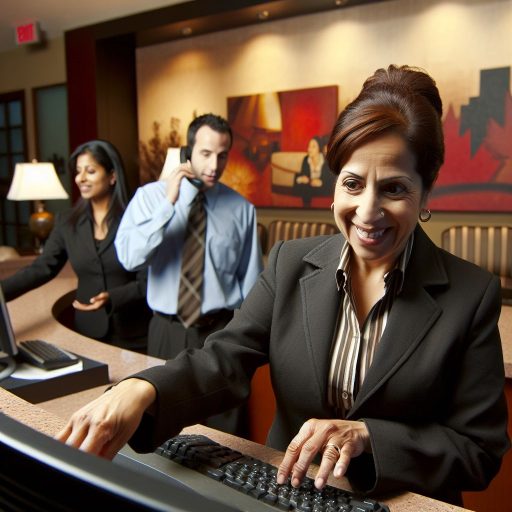Understanding the Role of a Front Desk Agent in Problem-Solving
Key Responsibilities
A front desk agent acts as the first point of contact for guests.
Agents manage reservations, check-ins, and check-outs efficiently.
Additionally, they handle customer inquiries and provide helpful information.
These responsibilities often lead to various guest concerns and complaints.
Importance of Problem-Solving Skills
Problem-solving is essential in the hospitality industry.
Front desk agents frequently encounter unexpected issues.
Effective problem-solving ensures guest satisfaction and loyalty.
Moreover, it enhances the overall experience for the guests.
Common Challenges Faced
Agents encounter various challenges daily.
- Overbooked rooms result in high-stress situations.
- Guests may experience dissatisfaction with their accommodations.
- Technical issues can disrupt the check-in process.
Each challenge requires a unique approach to resolve.
Strategies for Effective Problem-Solving
Implementing effective strategies can improve outcomes.
Firstly, active listening is crucial to understand guest concerns.
Next, agents should remain calm and composed in stressful situations.
Furthermore, they must think creatively to find solutions.
Documentation of prior issues can help in future resolutions.
Building a Problem-Solving Mindset
A proactive mindset aids in anticipating potential issues.
Agents should continuously learn from past experiences.
Training sessions on conflict resolution can enhance their skills.
Collaborating with team members fosters a supportive environment.
Key Skills Required for Effective Problem-Solving
Communication Skills
Effective communication fosters clear understanding between front desk agents and guests.
Additionally, active listening helps in identifying the root of problems quickly.
Using appropriate language and tone can diffuse tense situations effectively.
Critical Thinking
Critical thinking allows agents to assess situations swiftly and logically.
This skill enables them to evaluate multiple solutions before choosing the best one.
Furthermore, it helps in anticipating potential issues before they escalate.
Unlock Your Career Potential
Visualize a clear path to success with our tailored Career Consulting service. Personalized insights in just 1-3 days.
Get StartedEmotional Intelligence
Emotional intelligence is crucial for managing stress and tough customer interactions.
Agents must empathize with guests to create a supportive atmosphere.
This approach often leads to expedited resolutions.
Time Management
Time management skills allow agents to prioritize tasks effectively.
Efficiently handling multiple requests enhances the overall guest experience.
Moreover, good time management decreases the likelihood of overlooked issues.
Adaptability
Adaptability is vital in the ever-changing hospitality environment.
Agents must adjust to unexpected situations and guest needs promptly.
Flexibility improves problem-solving effectiveness under pressure.
Team Collaboration
Collaboration with team members strengthens troubleshooting efforts.
Sharing insights and experiences can lead to faster, better solutions.
Moreover, a cohesive team environment encourages open communication.
Common Challenges Faced at the Front Desk and Solutions
Dealing with Difficult Customers
Handling difficult customers is a typical challenge for front desk agents.
They may express frustration or complaints when service standards are not met.
To resolve this, listen actively to their concerns.
Additionally, maintain a calm and professional demeanor at all times.
You can also offer solutions that align with company policies.
Managing High-Pressure Situations
Pacifying high-pressure situations requires quick thinking and good organization.
During peak hours, front desk agents may face long lines and queues.
Implementing a ticketing system can effectively manage customer flow.
Encourage staff to remain focused on efficiency and service.
Addressing Technical Issues
Technical glitches can disrupt daily operations at the front desk.
Common issues include malfunctioning reservation systems or card readers.
To handle these, ensure proper training for all staff on technical tools.
Moreover, establish a troubleshooting protocol to follow during outages.
Coordinating with Other Departments
Effective coordination with housekeeping and maintenance is essential.
Communication gaps can lead to mismanaged guest expectations.
Hold regular briefings to update all departments on guest needs.
This approach fosters teamwork and enhances overall service quality.
Managing Customer Expectations
Set clear expectations about the services offered at your establishment.
Front desk agents can provide detailed information about amenities.
This transparency helps alleviate potential misunderstandings with guests.
Furthermore, actively seeking customer feedback can refine service delivery.
See Related Content: How Sommeliers Create Memorable Wine Tasting Events
Techniques for Active Listening and Empathy in Customer Interactions
The Importance of Active Listening
Active listening is vital for front desk agents.
Customers appreciate feeling heard and understood.
This reduces misunderstandings and builds trust.
Moreover, it enhances the overall customer experience.
Practicing Active Listening Techniques
Use eye contact to engage with the customer.
This demonstrates your attention and interest.
Furthermore, nodding can reassure the customer you are listening.
Paraphrase what they say to confirm understanding.
For instance, you might say, “So, you are concerned about your reservation?”
Responding with Empathy
Empathy involves understanding and sharing the feelings of another.
When a customer expresses frustration, acknowledge their feelings.
For example, say, “I understand this situation is frustrating for you.”
This approach can defuse tension and create rapport.
Additionally, validate their concerns to show you care.
Techniques for Enhancing Empathy
Practice patience when dealing with upset customers.
Take a moment to collect your thoughts before responding.
Keep your tone warm and soothing throughout the interaction.
Moreover, personalize your responses to each customer’s situation.
Ongoing Development of Problem-Solving Skills
Engage in role-playing exercises to improve your skills.
Seek feedback from colleagues on handling difficult situations.
Consider attending workshops focusing on customer service.
Additionally, read books or articles about effective communication.
Enhancing Customer Experiences through Active Listening
By mastering active listening and empathy, you enhance your performance.
A well-trained front desk agent can transform customer experiences.
Consequently, customers are likely to return and recommend your services.
See Related Content: The Role of a Casino Host in Enhancing Guest Experience
Utilizing Technology and Resources to Address Guest Issues
Embracing Modern Tools
Front desk agents must leverage modern technology effectively.
Using hotel management software streamlines communication with guests.
Mobile applications enhance guest experience and responsiveness.
Social media platforms offer immediate feedback from guests.
Implementing Efficient Workflow
A well-structured workflow ensures timely responses to guest inquiries.
Automation tools can handle repetitive tasks efficiently.
For example, automated emails can confirm reservations promptly.
Chatbots provide 24/7 assistance for common questions.
Enhancing Problem-Solving with Data
Data analytics plays a crucial role in identifying recurring issues.
Understanding trends can lead to proactive solutions.
Monitoring guest complaints helps improve services continuously.
Utilizing feedback forms allows for a better assessment of guest needs.
Collaborating with Other Departments
Coordination with housekeeping and maintenance teams is essential.
Sharing guest feedback helps others address specific concerns.
Regularly scheduled meetings foster a culture of open communication.
Collaboration ensures all departments align in providing excellent service.
Providing Personalization for Guests
Personalization enhances the guest experience significantly.
Utilizing guest history allows for tailored recommendations.
Understanding preferences can lead to surprise upgrades or amenities.
This approach fosters strong relationships with returning guests.
Discover More: Common Mistakes New Spa Managers Make

Developing Critical Thinking Skills for Quick Decision-Making
Importance of Critical Thinking
Critical thinking enhances your ability to make timely decisions.
It equips you with tools to analyze situations effectively.
As a front desk agent, you face various challenges daily.
Strong critical thinking skills can improve customer satisfaction.
Recognizing Problems
Begin by identifying what constitutes a problem.
Pay attention to customer complaints and service errors.
Focus on understanding the root causes behind issues.
This helps in formulating effective solutions quickly.
Evaluating Options
Next, assess the possible solutions for each issue.
Weigh the pros and cons of different approaches.
Involve your team for diverse perspectives when needed.
Collaboration often leads to better outcomes.
Taking Action
Once you’ve evaluated options, it’s time to act.
Choose the best solution based on your assessment.
Implement your decision decisively and efficiently.
Monitor results to gauge the effectiveness of your choice.
Learning from Experience
Every challenge is an opportunity to learn.
Reflect on what worked and what didn’t after every situation.
This builds your knowledge and sharpens your skills.
Continual improvement enhances your problem-solving abilities.
See Related Content: Key Differences Between Hotel and Office Front Desk Roles
Building a Positive Relationship with Guests to Facilitate Problem Resolution
Establishing Trust and Credibility
Trust lays the foundation for effective problem-solving.
Greet each guest warmly to create a welcoming environment.
Use their name to personalize the interaction.
This simple gesture fosters familiarity and trust.
Listen actively to their concerns without interruption.
This shows you value their opinion and experience.
Demonstrating Empathy and Understanding
Empathy is essential in addressing guest issues effectively.
Acknowledge their feelings and frustrations.
Phrase your responses with understanding, like “I can see how that would be frustrating.”
This reassures guests that you care about their experience.
Use appropriate body language to convey your sincerity.
Maintaining eye contact and nodding can build rapport swiftly.
Communicating Clearly and Effectively
Clear communication prevents misunderstandings.
Explain the steps you will take to resolve their issues.
This transparency promotes confidence in your abilities.
Check for understanding by asking if they have questions.
Reiterate important points to reinforce clarity.
Following Up for Satisfaction
Follow-up enhances guest satisfaction and loyalty.
After resolving the issue, check back with the guest.
Ask if they are satisfied with the solution provided.
This demonstrates your commitment to their experience.
Ultimately, it can lead to positive feedback and return visits.
Strategies for Managing Stress and Maintaining Professionalism During Difficult Situations
Recognizing Stress Triggers
Identifying stress triggers is crucial for front desk agents.
Common triggers include high guest expectations and tight deadlines.
Acknowledging these triggers allows agents to prepare mentally.
Furthermore, understanding personal limits helps manage stress effectively.
Utilizing Relaxation Techniques
Employing relaxation techniques can significantly alleviate stress.
Deep breathing exercises can be especially effective.
For instance, take a moment to inhale deeply and exhale slowly.
Additionally, practicing mindfulness can enhance concentration and calmness.
Maintaining a Positive Attitude
A positive attitude influences problem-solving effectiveness.
Focus on solutions rather than challenges when situations become tough.
Maintain a friendly demeanor to soothe frustrated guests.
This approach eases tension and promotes a cooperative atmosphere.
Effective Communication Skills
Clear communication is essential in managing guest expectations.
Listen actively to guests and validate their concerns.
Use assertive yet polite language for clear communication.
Ensure guests feel heard, as it builds trust and rapport.
Seeking Support When Needed
Asking for help is a sign of strength, not weakness.
Collaborate with colleagues to address challenging situations.
Sharing experiences can lead to effective solutions and reduced stress.
Additionally, supervisors can provide guidance and support as needed.
Prioritizing Self-Care
Self-care is essential for maintaining professional composure.
Engage in regular physical activity to boost mental resilience.
Ensure adequate rest to recharge and stay focused.
Moreover, engaging in hobbies can serve as a stress relief mechanism.
Additional Resources
Hospitality & Event Planning Certificate | Peninsula College




